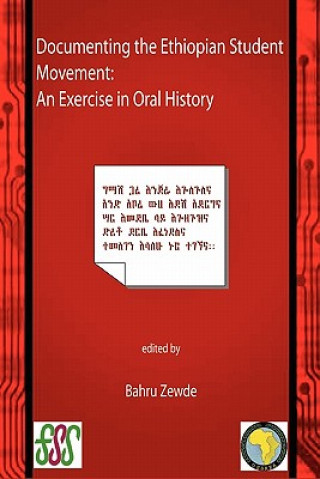
Code: 09019823
Documenting the Ethiopian Student Movement
by Bahru Zewde
The place of intellectuals (in the broad sense of the educated elite) in society has varied in place and time. The higher the level of industrial development, the less influence they seem to exercise. Thus, while intellectuals may ... more
- Language:
 English
English - Binding: Paperback
- Number of pages: 164
Publisher: Forum for Social Studies (FSS), 2010
- More about this

You might also like
-

Super Juice Me!
57.05 zł -23 % -

Behind Her Eyes
47.71 zł -23 % -

Zen of Tantra. Tibetan Great Perfection in Fahai Lama's Chinese Zen Monastery
126.31 zł -

Le Corbusier Guide
122.14 zł -

CHRISTMAS SOLOIST THE MEDHIGH
69.75 zł -6 % -

Research in Law Enforcement Selection
105.19 zł -

Wise Shall Inherit Glory
107.62 zł
Give this book as a present today
- Order book and choose Gift Order.
- We will send you book gift voucher at once. You can give it out to anyone.
- Book will be send to donee, nothing more to care about.
More about Documenting the Ethiopian Student Movement
You get 129 loyalty points
 Book synopsis
Book synopsis
The place of intellectuals (in the broad sense of the educated elite) in society has varied in place and time. The higher the level of industrial development, the less influence they seem to exercise. Thus, while intellectuals may be sought as advisors and members of think tanks in the so-called First World, they are rarely seen exercising direct state power. The situation is different in the so called Third World, notably Africa. The educated elite has historically seemed destined - by social ascription or self-arrogation - to play a central role in the exercise of state power. In Africa alone, the first generation of post-independence rulers - Kwame Nkrumah of Ghana, Léopold Sedar Senghor of Senegal, Julius Nyerere of Tanzania - provides us with ample evidence to appreciate this reality. In Ethiopia, too, intellectuals have played a role and exercised an influence disproportionate to their size. This can be divided broadly into two phases, with the Italian Occupation (1936-1941) forming an important watershed between them.The pre-war intellectuals were preoccupied with a whole gamut of concerns ranging from educational development to fiscal reform. They had an essentially reformist agenda.The Fascist Italian invasion and the subsequent occupation not only terminated their careers but also - through its merciless policy of liquidation of the educated elite - created a gap in intellectual activity in the immediate post - Liberation years. The second period of intellectual intervention could thus begin only in the late 1950s. It revolved mainly around Ethiopian students (mostly at the tertiary level at the initial stage), both at home and abroad. This eventually evolved into what came to be known as the Ethiopian Student Movement. The movement could be said to have gone through three successive stages: self-awareness, reformism, revolutionary commitment. There is general agreement that the year 1965, when students came out onto the streets with the slogan of "Land to the Tiller", marked the beginning of the third stage. It is this third stage that is the focal point of this study. For it constitutes the crucial period that forms both the backdrop and the essence of the changes that have come to affect fundamentally the Ethiopian state and society - changes that are yet far from over.
 Book details
Book details
Book category Books in English Humanities History Regional & national history
223.07 zł
- Full title: Documenting the Ethiopian Student Movement
- Subtitle: An Exercise in Oral History
- Author: Bahru Zewde
- Language:
 English
English - Binding: Paperback
- Number of pages: 164
- EAN: 9789994450336
- ISBN: 9789994450336
- ID: 09019823
- Publisher: Forum for Social Studies (FSS)
- Weight: 260 g
- Dimensions: 228 × 154 × 11 mm
- Date of publishing: 26. August 2010
Trending among others
-

Hundred Years' War on Palestine
55.03 zł -19 % -

Ethnic Cleansing of Palestine
58.27 zł -19 % -

History of Japan
78.68 zł -9 % -

Ten Myths About Israel
52.89 zł -14 % -

Strange Death of Europe
66.80 zł -19 % -

Decline and Fall of the Roman Empire
22.53 zł -29 % -

Secret History
66.60 zł -11 % -

God's Playground A History of Poland
294.15 zł -

Mayflower
76.14 zł -13 % -

How to be a Victorian
52.38 zł -23 % -

Plantagenets
61.73 zł -23 % -

General's Son
85.49 zł -6 % -

Iran: A Very Short Introduction
43.04 zł -23 % -

Temples of Karnak
657.16 zł -

Cuneiform
47.71 zł -23 % -

Twenty Years A-Growing
43.04 zł -23 % -

Bohemian Paris
78.89 zł -9 % -

History of Witchcraft in England from 1558 to 1718
78.38 zł -

China in Africa
154.74 zł -

Islandman
43.04 zł -23 % -

Lancaster And York
89.24 zł -

Alexiad
85.69 zł -10 % -

Modern France: A Very Short Introduction
55.73 zł -9 % -

Inside Hitler's Greece
101.53 zł -10 % -

Diana: Her True Story - In Her Own Words
49.85 zł -19 % -

The Fourth Turning
79.90 zł -13 % -

The Oxford History of Ancient Egypt
66.30 zł -23 % -

Churchill: The Power of Words
66.80 zł -19 % -

Palestine
88.74 zł -19 % -

Korean History in Maps
121.43 zł -8 % -

Great Gatsby (Wisehouse Classics Edition)
32.99 zł -70 % -

Viking Way
197.99 zł -6 % -

The Thirteenth Tribe
58.78 zł -

My Promised Land
58.27 zł -19 % -

Vanished Kingdoms
83.56 zł -19 % -

Age Of Revolution
70.97 zł -23 % -

Life and Death of Anne Boleyn
101.02 zł -3 % -

Coming of the Third Reich
80.31 zł -23 % -

Children of Ash and Elm
80.31 zł -23 % -

Europe Between the Oceans
142.25 zł -9 % -

Socialism Betrayed
94.12 zł -9 % -

303 Squadron
80.31 zł -23 % -

Ancient Celts, Second Edition
129.05 zł -9 % -

Dancing in the Glory of Monsters
76.14 zł -13 % -

Battle of Britain: Luftwaffe Blitz (Images of War)
104.88 zł -7 % -

Age of Confucian Rule
140.52 zł -

Beyond Band of Brothers
70.97 zł -23 % -

Benjamin Franklin
70.97 zł -23 % -

On China
75.23 zł -19 %
safisfied customers
Since 2008, we have served long line of book lovers, but each of them was always on the first place.
Copyright! ©2008-24 libristo.pl All rights reservedPrivacyPoučení o cookies



 21 million books
21 million books Delivery 12.99 zł
Delivery 12.99 zł (32) 444 93 66 (8-15.30h)
(32) 444 93 66 (8-15.30h)